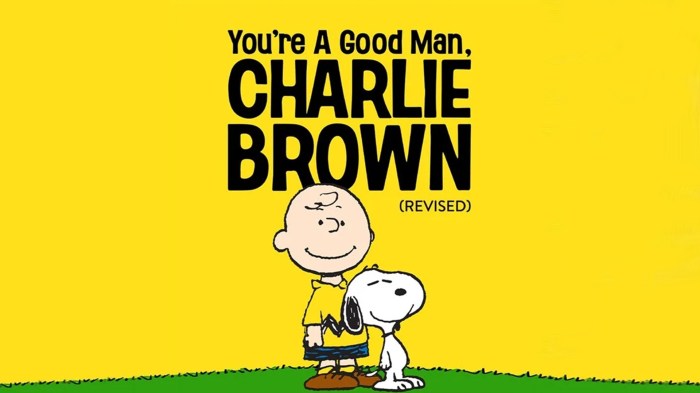Lucy monologue you’re a good man charlie brown – In “You’re a Good Man, Charlie Brown,” Lucy’s monologue stands out as a captivating portrayal of a complex and enigmatic character. Through her incisive observations and witty remarks, Lucy sheds light on the human condition, exploring themes of self-awareness, social norms, and the search for meaning.
Lucy van Pelt, the self-assured and opinionated best friend of Charlie Brown, takes center stage in this monologue, offering a unique perspective on the world around her. Her sharp tongue and keen insights provide a window into her motivations, personality traits, and relationships with other characters.
Character Analysis of Lucy
Lucy van Pelt is a complex and multifaceted character in the play “You’re a Good Man, Charlie Brown.” She is known for her sarcastic wit, bossy nature, and unrequited crush on Schroeder.
Motivations
- Lucy is driven by a desire for power and control.
- She seeks attention and validation from others.
- Her crush on Schroeder motivates her to try to win his affection, even though she knows it is unlikely.
Personality Traits
- Sarcastic and witty
- Bossy and controlling
- Insecure and self-absorbed
- Loyal to her friends, despite her often-abrasive behavior
Relationships with Other Characters
- Lucy has a complicated relationship with Charlie Brown. She often teases and belittles him, but she also cares for him and tries to help him when he is down.
- She is in love with Schroeder, but he is not interested in her romantically.
- Lucy is friends with Sally, Linus, and Pig-Pen, but she often treats them with disdain.
Significance of Her Role
Lucy is a central character in the play. She provides comic relief with her sarcastic remarks and bossy behavior. She also helps to develop the other characters, especially Charlie Brown and Schroeder.
Themes and Symbolism

Major Themes
- The importance of self-acceptance
- The challenges of growing up
- The power of love
Symbolism
- The football represents Charlie Brown’s hopes and dreams. Lucy’s constant pulling of the football away symbolizes the disappointments and setbacks that he faces in life.
- The kite represents Linus’s security blanket. It symbolizes his need for comfort and protection.
- The piano represents Schroeder’s love of music. It also symbolizes his aloofness and detachment from the other characters.
Contribution to Overall Meaning
The themes and symbolism in the monologue help to convey the play’s overall message of hope and resilience. Despite the challenges they face, the characters in the play learn to accept themselves and find happiness in their own way.
Literary Devices and Techniques: Lucy Monologue You’re A Good Man Charlie Brown

Literary Devices
- Irony: Lucy’s sarcastic remarks often create irony, as she says one thing but means another.
- Hyperbole: Lucy often exaggerates her emotions and experiences, using hyperbole to create a comedic effect.
- Metaphor: Lucy uses metaphors to compare herself to other characters and to describe her own experiences.
Techniques, Lucy monologue you’re a good man charlie brown
- Stream of consciousness: Lucy’s monologue is written in a stream of consciousness style, which allows the audience to hear her thoughts and feelings directly.
- Dialogue: Lucy’s monologue includes dialogue with other characters, which helps to develop her relationships with them.
- Stage directions: The monologue includes stage directions that provide information about Lucy’s movements and actions.
Impact of Devices and Techniques
The literary devices and techniques used in the monologue help to create a vivid and engaging character. Lucy’s sarcastic wit, bossy behavior, and unrequited crush on Schroeder are all brought to life through the use of these devices and techniques.
Impact on the Audience
Emotional Impact
Lucy’s monologue can evoke a range of emotions in the audience. Her sarcastic remarks can be funny, but they can also be hurtful. Her bossy behavior can be annoying, but it can also be seen as a sign of her insecurity.
Her unrequited crush on Schroeder can be both heartbreaking and humorous.
Language and Imagery
Lucy’s use of language and imagery helps to create a strong emotional impact on the audience. Her sarcastic remarks are often delivered with a sharp wit, which can be both funny and hurtful. Her bossy behavior is often accompanied by exaggerated gestures, which can be both annoying and amusing.
Her unrequited crush on Schroeder is expressed through a series of metaphors and similes, which can be both heartbreaking and humorous.
Potential to Inspire, Challenge, or Provoke Thought
Lucy’s monologue has the potential to inspire, challenge, or provoke thought in the audience. Her sarcastic remarks can challenge the audience to think about their own behavior and motivations. Her bossy behavior can provoke thought about the nature of power and control.
Her unrequited crush on Schroeder can inspire the audience to think about the importance of self-acceptance and resilience.
Historical and Cultural Context

Time Period and Social Norms
The monologue was written in the 1960s, a time of great social and cultural change. The play reflects the changing attitudes towards gender roles and the increasing importance of self-expression.
Influence on Content and Reception
The time period and social norms of the 1960s influenced the content and reception of the monologue. Lucy’s sarcastic remarks and bossy behavior would have been seen as more acceptable at the time than they might be today. Her unrequited crush on Schroeder would have also been seen as more common and less controversial.
Relevance to Contemporary Society
The monologue remains relevant to contemporary society because it addresses universal themes such as the importance of self-acceptance, the challenges of growing up, and the power of love. Lucy’s character is still relatable to audiences today, as she represents the many people who struggle with insecurity, self-doubt, and unrequited love.
Comparison to Other Works

Similarities to Other Monologues
Lucy’s monologue is similar to other monologues in literature and theater in that it reveals the inner thoughts and feelings of a complex character. It is also similar to other monologues in that it uses humor and irony to create a comedic effect.
Differences from Other Monologues
Lucy’s monologue is unique in that it is delivered by a female character who is not traditionally seen as a sympathetic figure. Lucy is often seen as bossy, sarcastic, and self-centered. However, her monologue reveals that she is also insecure and vulnerable.
Unique Contribution to the Literary Landscape
Lucy’s monologue makes a unique contribution to the literary landscape by providing a complex and nuanced portrayal of a female character who is not traditionally seen as sympathetic. The monologue also challenges traditional gender roles and expectations.
Answers to Common Questions
What is the significance of Lucy’s relationship with Charlie Brown?
Lucy’s relationship with Charlie Brown is a complex and ambivalent one. She often teases and belittles him, but she also shows moments of genuine care and affection. This dynamic highlights the complexities of human relationships and the ways in which people can both hurt and support each other.
How does Lucy’s monologue reflect the social norms of her time?
Lucy’s monologue reflects the prevailing social norms of the 1950s, when the play was written. Her emphasis on conformity, gender roles, and the importance of social status reveals the expectations and pressures that were placed on individuals during that era.
What is the main theme of Lucy’s monologue?
The main theme of Lucy’s monologue is the search for self-awareness and meaning in a world that often feels chaotic and unpredictable. Lucy’s reflections on her own identity, her relationships with others, and the nature of happiness provide a poignant exploration of the human condition.